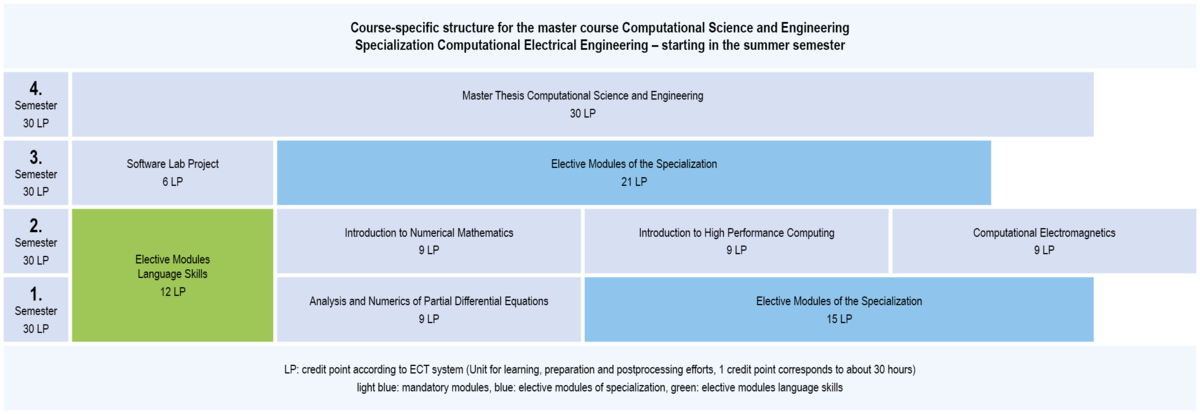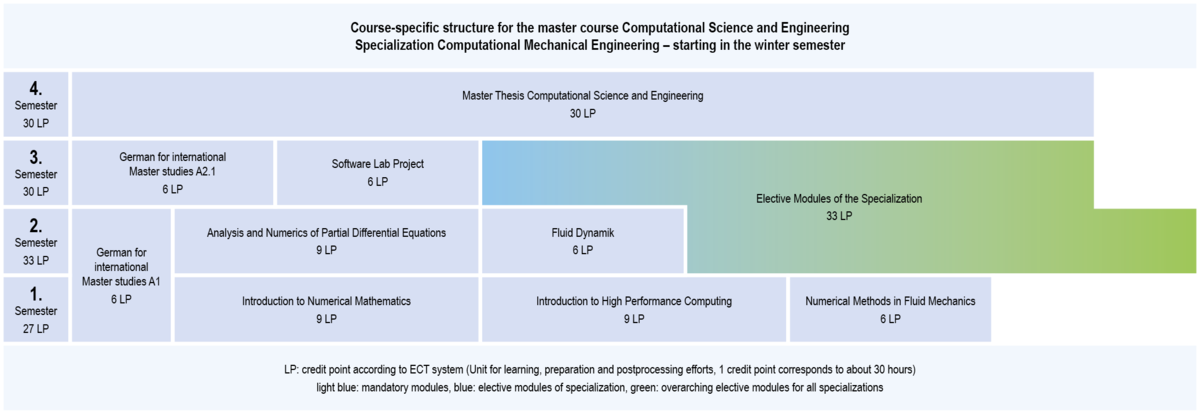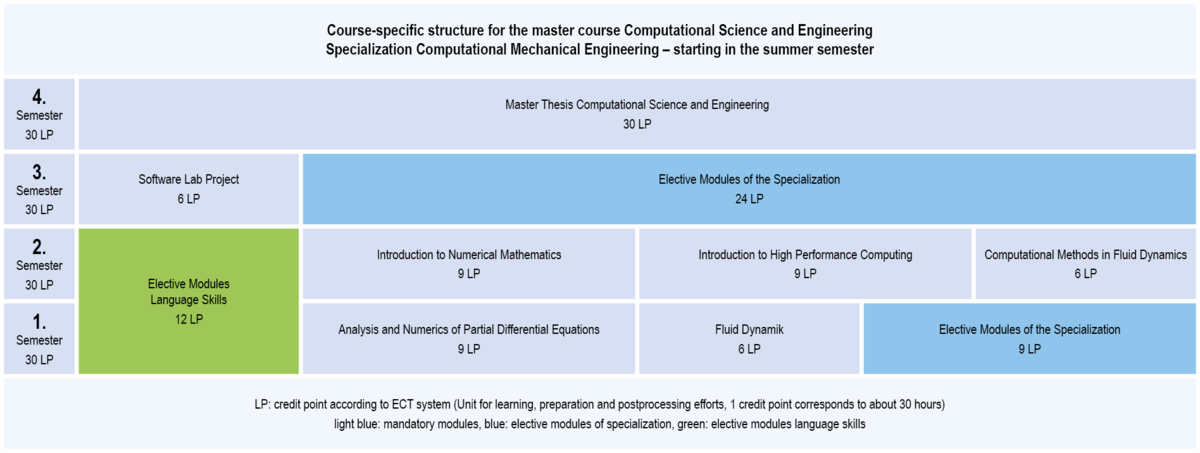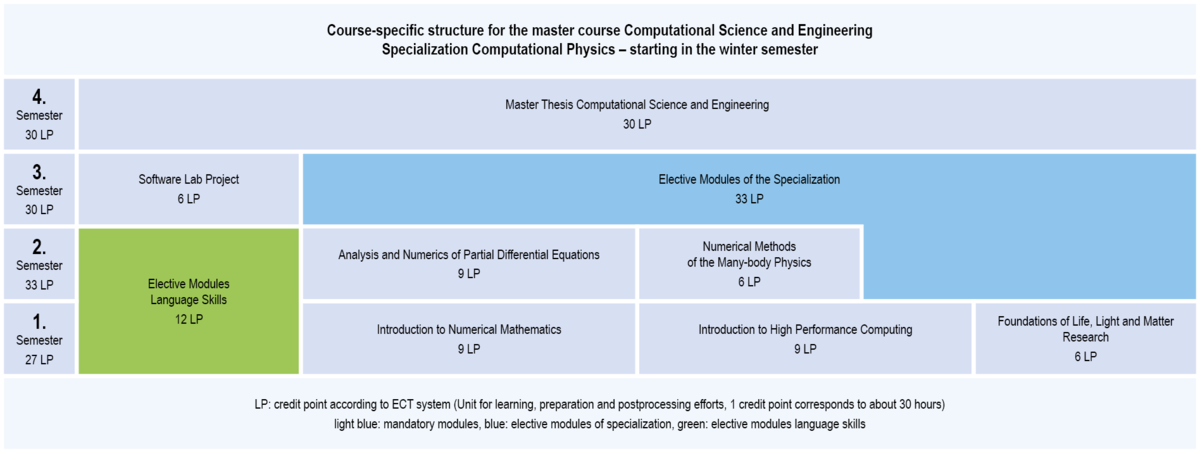Computational Science and Engineering is a new, rapidly growing field that is, in addition to the major subject, based on Applied Mathematics and Computer Science. The aim of the course is the acquisition of skills to carry out computer simulations of technical and natural systems in Electrical or Mechanical Engineering as well as Physics based on a sound knowledge of numerical methods. Numerical simulations allow the work on fields that are inaccessible to conventional tests and investigation methods. As computers get more powerful, the scope for modeling and simulation is constantly expanding. In many cases, the design process is already happening only inside the computer.
Three specializations offered:
- Computational Electrical Engineering (CEE)
- Computational Mechanical Engineering (CME)
- Computational Physics (CP)
The language of instruction in the master's program in Computational Science and Engineering is English. It is possible to complete the entire master's program in English. Individual elective modules including module exams are offered in German.
The master's program in Computational Science and Engineering leads to a second professional qualification and enables you to pursue a doctorate.
Successful completion of this course of study entitles you to use the protected professional title of “engineer” in accordance with the Architectural and Engineering Law of the State of Mecklenburg-Western Pomerania.
You are well prepared for the start of this course, if you have completed your Bachelor's degree with good results and also have a good knowledge of the English language. In addition you have an special interest in scientific-technical and engineering-based issues, software development and and research-based work.
The course offers three specializations
- Computational Electrical Engineering (CEE)
- Computational Mechanical Engineering (CME)
- Computational Physics (CP)
Students must select one of these specializations in their application.
In both courses, Computational Electrical Engineering and Computational Mechanical Engineering, the start of studies is recommended for the winter semester as otherwise there will be only a limited range of modules to select.
The Computational Physics course may only be commenced in the winter semester since the specific obligatory fundamental lecture is not available in summer semesters.
In the first three semesters, you deepen your knowledge in numerical analysis, partial differential equations, as well as high-performance computing and your classes from the respective module catalog. There are compulsory German courses for all majors. German-speaking students select another language. The 4th semester is for the master thesis.
The course is offered in English. It is suitable for English speaking international students. It is also suitable for German-speaking students with very good knowledge of English who pursue an international career and in addition to the acquisition and apply of advanced skills of English language.
A semester abroad to deepen the knowledge is possible after the end of the 1st semester.
The level of expertise and academic qualifications of Master of Science comply with the internationally and in Germany well known degree "Diplomingenieur". The various choices in the areas of specialization offered ensure both the scientific depth as well as the relevance of the study for industrial practice. Successful completion of this course of study entitles you to use the protected professional title of “engineer” in accordance with the Architectural and Engineering Law of the State of Mecklenburg-Western Pomerania.
The Faculty of Computer Science and Electrical Engineering ensures excellent care because of very good student-professor ratio. Further advantages are the proximity to the library, to student dormitories and to the cafeteria.
Individual part-time studies possible: Students who can only spend about half of the time budget for the study work because of a job or because of family obligations, have the opportunity to apply for the study form Individual part-time studies (Individuelles Teilzeitstudium) twice each for two semesters. Of the two semesters then only one semester will be counted to the standard period of study.
Within this course, you will acquire a broad range of skills that is indispensable for engineers and physicists with a focus on simulation and numerical computing methods. The university master’s degree offers best possibilities for a leading or researcher position in the field of engineering in Germany and abroad, or to enter a doctoral program. The ever-growing demand for engineers and physicists with profound knowledge of computational mathematics opens up prospects for the future with excellent career opportunities.
Admission requirements:
Completion of a first academic degree in Computational Science and Engineering, Electrical Engineering, Information Technology, Mechanical Engineering, Physics with at least 180 credit points or another equivalent qualification; with at least 85 % of the CGPA (Cumulative Grade Point Average) or a comparable grade or Graduate Aptitude Test in Engineering (GATE) with at least score 500
Native language English or English proficiency TOEFL IBT with at least score 90 or IELTS with at least score 6.5 (the certificate should not be older as two years)
solid knowledge in mathematics: especially linear algebra, calculus (integral, vector ...), numerics and stochastics
solid skills in a programming language, e.g. C/C++, Fortran, Java, Python and solid knowledge in computer architecture, operating systems and computer networks
proof of profound knowledge: CEE: Electromagnetic Fields and Waves (at least 3 credit points), Mathematics (at least 18 credit points), Programming / Practical Computer Science (at least 6 credit points) / CME: Mathematics (at least 18 credit points), Technical Mechanics (at least 18 credit points), Thermodynamics (6 credit points), Fluid Mechanics (6 credit points) and Programming (at least 9 credit points) / CP: Quantum Mechanics (at least 9 credit points), Electrodynamics and Optics (at least 6 credit points), Statistical Physics (at least 6 credit points) and Mathematics (at least 18 credit points)
This degree program is not restricted to admission (no numerus clausus).
Prospective students from the University of Rostock
An application is not required.
Enrollment takes place online in the registration portal of the University of Rostock:
- from August 1st to September 30th for the next winter semester or
- from February 1st to March 31st for the next summer semester
further information:
- enrollment for masters courses (including description form) (Uni-Web)
Prospective students from Germany
An application is not required.
Enrollment is online in the enrollment portal of the University of Rostock:
- from the 1st of August to the 30st of September for the next winter semester or
- from the 1st of February to the 31st of March for the next summer semester
further information:
- enrollment for masters courses (Uni-Web)
Please also note the information on the application.
International prospective students must be in the period
- from the 1st of April to the 31th of May for the next winter semester or
- from the 1st of October to the 30th of November for the next summer semester
apply online at UniAssist and then enroll in the degree program at the University of Rostock upon receipt of the admission letter. More information can be found on the Website of the University of Rostock below.
further information:
- Application for the study courses of the faculty of Computational Science and Electrical Engineering via Uni Assist
- master courses for international students
- full-time degree program information for non-German prospective students
Application: application via Uni-Assist, see www.uni-assist.de
Further information can be found here:
Broschures
► Broschure (pdf) (english)
► Broschüre (pdf) (deutsch)
Framework Examination Regulations (RPO)
The general rules of study in Bachelor's and Master's degree programs at the University of Rostock are determined by the
► Framework Examination Regulations (Bachelor/Master) in the currently valid version.
Specific Examination and study Regulations
The detailed rules for the study of a specific study program, are then regulated in the respective program-specific examination and study regulations (SPSO). When entering a higher subject semester, older versions of the SPSO may apply (see history).
M.Sc. Computational Science and Engineering
aktuell gültig für Neuimmatrikulationen zum 1. Fachsemester:
► Neufassung (2018) → Nicht amtliche englische Lesefassung
University of Rostock
Faculty of Computer Science and Electrical Engineering
Departmental student advisory service of the faculty
Prof. Dr.-Ing. Dennis Hohfeld
fon: +49 (0)381 - 498 7004
cse.ief(at)uni-rostock.de
Address:
Albert-Einstein-Straße 2 (Seminargebäude) | 18059 Rostock | GERMANY
Room 016
consultation hours after arrangement
Study Office and Examination Office Computer Science International
Anita Björk-Pagel
Tel.: +49 (0)381 - 498 7004
cse.ief(at)uni-rostock.de
Address:
Albert-Einstein-Straße 26 | 18059 Rostock | GERMANY
Room 006
consultation hours after arrangement
More information at the faculty website:
Student Service Center (SSC) of the University of Rostock
Info service in the SSC: Central contact point for prospective students and students
The Student Service Center brings together all the important information and advice offered by various institutions for prospective students and students. Those seeking advice should first contact the info service. If necessary, referrals are made here or an individual consultation appointment is arranged.
Parkstraße 6, 18057 Rostock, GERMANY, room / Raum 024
fon: +49 (0)381 - 498 1230
studium(at)uni-rostock.de
contact and office gours: Student Service Center (SSC) of the University of Rostock – Homepage







